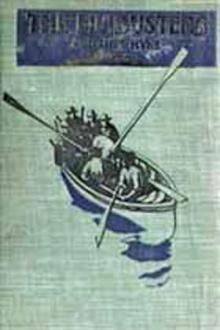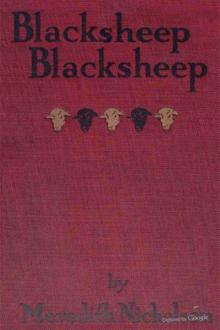The Filibusters - Charles John Cutcliffe Hyne (best english books to read for beginners .TXT) 📗

- Author: Charles John Cutcliffe Hyne
- Performer: -
Book online «The Filibusters - Charles John Cutcliffe Hyne (best english books to read for beginners .TXT) 📗». Author Charles John Cutcliffe Hyne
The Filibusters
A Romance
By Cutcliffe/Hyne
Author of “The Adventures of Captain Kettle,” etc.
This story deals with the participants in an expedition that successfully captures the presidency of a Central American republic. It is very exciting, the incidents being fresh and daring with not too much reliance placed on coincidence.
NEW YORK
Frederick A. Stokes Company Publishers
Copyright, 1900, By Frederick A. Stokes Company.
CONTENTS
I. THE FIRST ENLISTMENT
II. A SCHEME OF REVOLUTION
III. THE SECOND ENLISTMENT
IV. WHITE TORTUGA KEY
V. A DUET IN CANON
VI. THE LADY OF WIT WITH THE MASK
VII. INITIA BELLI
VIII. FREE WOMEN
IX. OCCUPATION OF THE ANGELS
X. A CHAIR AMONGST THE GREAT ONES
XI. POLITICS AND A PLAIN GOLD RING
XII. THE OTHER OF THE INFLUENCES
XIII. PREPARATIONS FOR AN EXIT
XIV. FATHER JUPE
XV. AN INDUCEMENT TO MARRIAGE
XVI. THE MARRIAGE OF DONNA DELICIA
XVII. OVER THE HILLS AND FAR AWAY
XVIII. SUCCESS WANTED, NOT EXCUSE
XIX. H. M. S. RABBIT
XX. THE CORNERED CLARINDELLA
XXI. THE END OF CAREW’S GUERILLAS
XXII. FLOREAT SACARONDUCA
THE FILIBUSTERS
THROUGHOUT the event narrated in the follow— ing history there were two Influences at work, which, counting from start to finish, we regarded with a very different set of emotions.
At first, being ignorant of their bare existence, we ignored them with all completeness. We had confidence in our wit, and the strength of our own right hands, and felt fear for no man living.
Next, having the work of the Influences violently thrust against our wishes and our welfare, or, again, pulling in our favour, we considered them with awe and some fright, as men must do things which shoot mysterious arrows and boons out of nothingness.
But afterwards, when we saw their fingers gripped on all the Master-strings, and knew with precision what manner of creatures they were, then we came to look upon the Influences with the two extremes of sentiment this day known to men. When the Influence was adverse, we classed it with the worst of things diabolic; but when it aided us, an enthusiasm spirited up in us that was near akin to worship.
We did not act on precedent in this, as there was no such thing as precedent to draw from. Our minds worked as our natures drove them; human-wise, that is; and because the Influences themselves were intensely human in the least as in the greatest of their efforts, nothing happened which might not have been altogether expected. But it was only, after all, the ties which bound us to Sacaronduca had been woven, ravelled, and finally broken for always, that we thoroughly understood this. No man can judge calmly and without prejudice when he is acting as a hot partisan in a furnace of action.
Now, not counting Briggs, who was inscrutable, we five who considered ourselves in the know clearly understood that Holsteins were backing the revolution. Of course, there is nothing very peculiar in that. Holsteins are the greatest financial house in the world; have a headquarters in each capital of Europe (except St. Petersburg); and hold a say in every war which is fought throughout the world. They carry no arms, being Israelites; but they command all things and all men concerned, by reason of holding the necessary purse. On the surface they do not appear; and the Kings and the Emperors and the Presidents blow the war-trumpet with their own lips. But it is virtually one of the Barons Holstein who says to the nations, ” Ye have my leave to fly at one another’s throats: here be stores of gold and silver,” or, ” Ye shall have no money with which to fight: wherefore keep ye the peace.”
With Holsteins, the revolution was to be a matter of speculative business. Their reward in case of our success was to be concession of territory for a railway, and extensive mining rights; so that if the thing came off with a win, they would have the happiness of adding a few more paltry millions to their ponderous capital. If, on the other hand, the existing Government of Sacaronduca proved too strong for the revolutionary forces, then Holsteins would drop a considerable amount of hard cash.
Looking at the matter in the light of afterknowledge, of course I see now that one of our actuating Influences must have been very hard at work in getting Holsteins to meddle with the business at all; seeing that (from their point of view) it was so very like a gamble as to be scarcely worth the name of speculation in any degree whatever. But this did not strike us when we of the executive had our preliminary meetings in Briggs’ room at the Metropole in London. We were most of us extremely sweet on the chances of revolution then, arid vented sarcasm on Hebraic hardness over driving bargains.
But at the same time we were not fools enough to go about feeling too disgustingly cocksure that we should bring about a win. In fact the excitement of all of us was kept bubbling by the volcanic uncertainty of the thing. Fluellen, in particular, though quite the keenest of us for going forward, took a gloomy view of the chances from the very beginning. As General Briggs clearly put it to us, we mercenaries would be the principal persons to pay the piper in the case of non-success. That part of the world does not produce the climate which nourishes half-measures. If we got defeated and did not happen to be comfortably killed beforehand, we should have small favour to expect from President Maxillo when he contrived to lay hands upon us. He was a man half-Spanish, half-Indian; reared amongst the crackle of Central American revolutions; merciless as a Thug. If we succeeded, we could dub ourselves by any name that pleased us in the dictionary; but in the event of failure, we should rank as filibusters, as land-pirates of the baser sort, and the Government of Great Britain and all the other Governments on earth would thank the Dictator of Sacaronduca for stamping us out.
Briggs, who was our president designate Don Esteban Puentos, they called him in Sacaronduca Briggs, I say, made no disguise about the matter. He said on the day that we signed our formal agreements with him: ” I warn you gentlemen clearly what there is to look forward to. The existing Government is nothing more nor less than a successful brigand’s camp. This is no exaggeration: it is a notorious fact. If we upset the present rulers and bring about a state of things more in accordance with common honesty and healthy progress, there will be no words too good for us. The country is brimming with possibilities, but so far it has never had a chance ever since the first white man came to cumber the soil. If a Sacaronducan shows energy and enterprise, and puts money together, or founds a business, or starts a mine, all his neighbours promptly take a grab at the plunder, and the Government naggles for the biggest share. No man has a chance to exert his strength on legitimate lines. And so the strong man who means to go ahead, has only one opening before him. Circumstances will not let him be honest; and consequently he aspires to be as big a rogue as possible. As a result all the able men of the country adopt the harrying of their neighbours as their natural profession.
“Now, gentlemen, I am no propounder of a thousand niggling laws. I believe in men doing much as they please within reasonable limits. But there are limits, and Sacaronduca treads over them. If I get my grip on the country, I shall stop that little game without a vignette. I shall make no pretence of letting them down gently. That would be merely a confession of weak-mindedness. One cannot act there according to any European code of ethics: ‘autre pays, autre mceurs.’ So, gentlemen, I shall apply the only argument understanded of the people, and shoot the worst cases out of hand.
“As a result, the country will leap at its chance, and improve with a rush. The Sacaronducans themselves will open it out much, and our fellows whom we bring with us will open it out still more. And the outside world will see that a Central American Republic need not of necessity be a helpless seething volcano of anarchy.
“There is risk about all this, of course, but I think that my friends out there, with your help, gentlemen, can bring it to pass. If we are successful, the natives who help will be called patriots, you will be high-minded military philanthropists, and I shall be numbered amongst the world’s great liberators. Only a few newspapers who do not understand or who are interested in the other party will yap. But if we are beaten, you must understand clearly what will happen. We shall be bloody-minded rebels and murderous filibusters. If once we step on to the planks of that pillory, there are not ten people in the world who will not join in the howl against us.”
The head of the revolution paused, glancing his grey eyes keenly from one to the other of us. Most of us found plenty of occupation in digesting what he had said. It was Coffin who broke the silence.
“It’s best so, General,” he said cheerfully. “As things are, we’re being ridden on the spur, and so we’re likely either to get there or bust. I take it that’s the way to handle this event. There’s no consolation prize to look for except a platoon or a cable of hempen tow and a tree, or, perhaps, to be more local, ‘ el garrote.’ And in that case it’s mere foolishness to insure oneself so as to have something left for the next event. Once we start its ‘ vestigia nulla retrorsum,’ fortunes or funerals, unlimited shooting, and a price on your head. General, you’ve offered me the first bit of excitement in all creation, and I’m just filled up with delight at the thought of it. I’ll drink to it this minute. No, not champagne. It’s too good a thing, this of yours, to wish luck to in the best champagne that was ever wired. By your leave I’ll be true to my country, and mix myself a whisky and soda, and do proper justice to you in that.”
He went to the sideboard and returned to the table with a hissing tumbler-load. He put one foot on a chair and thrust the glass of liquor high in the air. ” Gentlemen.” he cried, ” I call upon you to drink in bumpers to General Briggs and a blazing revolution.”
His enthusiasm set the match to ours. We, too, sprang up, with leaping glasses; and the face of the man we drank flushed with pride and pleasure. But he did not say anything. He nodded gravely, and lit a fresh cigar.
It was Davis who put in the next word. ” May I inquire, sir,” he said, “a little more about the social aspect of this business? In cases of success, shall we find an assured position in Sacaronducan society?”
I saw Coffin cock his eye at Carew, and understood the grin which passed between them. The question was very typical of Davis. He was desperately bent on bettering himself





Comments (0)